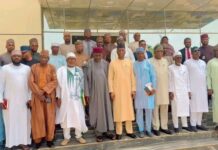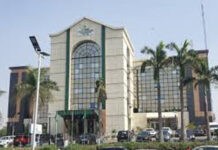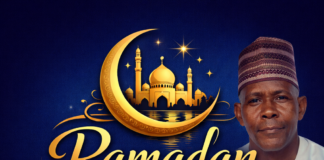By Imam Murtadha Gusau
In the name of Allah, the Most Gracious, the Most Merciful
All praise is due to Allah, the Subduer. I testify that there is nothing worthy of worship except Allah and I testify that Prophet Muhammad is His servant and Messenger.
Dear brothers and sisters! Fear Allah as He should be feared so that you will prosper in this world and the Hereafter.
Respected brothers and sisters! The aspiration of lofty goals and the fulfillment of one’s religious obligations require a great deal of time, effort and wealth. One’s very life may even be at stake during the course of fulfilling these great objectives in addition to the loss of friends, the gaining of enemies, the exposition of oneself to ridicule and the vulnerability of having few helpers and protectors. This in fact was exactly the situation of the Prophet Muhammad (Peace be upon him) during his propagation of Islam.
Allah Almighty sent Prophet Muhammad (Peace be upon him) to all mankind at the time when they were most in need of his message. The People of the Book, Ahlil-Kitab (i.e. the Jews and Christians) had by then altered their books and the whole world was in the total darkness of polytheism and ignorance. It was at this time that Allah the Most High chose to send His great servant, Prophet Muhammad (Peace be upon him) to mankind. Allah the Almighty says:
“Say [O Muhammad], ‘O Mankind, indeed I am the Messenger of Allah to you all, [from Him] to whom belongs the dominion of the heavens and the earth. There is no deity except Him; He gives life and causes death.’” [Surah Al-A’raf: 158]
My people! The Prophet Muhammad (Peace be upon him) was sent at a time when people were worshipping unworthy objects such as human beings, saints, trees, stones, idols, the moon, angels, Jinns, the Prophet Isa (or Jesus, Peace be upon him) etc. He (Peace be upon him) found them supplicating to these deities, seeking assistance and refuge with them, beseeching them for benefits, slaughtering for them, vowing to them, and taking them as intermediaries to Allah. He (Peace be upon him) also found them consulting fortunetellers and sorcerers, spreading superstition, immorality, mistreating neighbours, severing bonds of kinship, earning money from dubious means, practicing interest-based transactions and usurping other people’s properties. This was in addition to all the other well-known evils that were prevalent in that society. Their religion, customs and traditions were purely based on personal interests and material considerations.
It was at this very time that Allah Almighty sent His beloved Messenger (Peace be upon him) to mankind, calling people to testify that there is nothing worthy of worship except Allah alone and that Muhammad is the Messenger of Allah. He (Peace be upon him) called to all that this statement entailed such as devoting all acts of worship like Du’a or supplication, slaughtering, vowing, and seeking help and refuge, making Tawaf, or circumambulation of the Ka’abah, etc. to Allah alone. Allah the Most High says:
“Say, ‘Come, I will recite what your Lord has prohibited to you. [He commands] that you not associate anything with Him…'” [Surah Al-An’am: 151]
He (Peace be upon him) also called on mankind to take himself as the only example for guidance. Allah the Almighty says:
“…And whatever the Messenger has given you – take; and what he has forbidden you – refrain from.” [Surah Al-Hashr: 7]

“Say, ‘My Lord has only forbidden immoralities – what is apparent of them and what is concealed – and sin, and oppression without right, and that you associate with Allah that for which He has not sent down authority, and that you say about Allah that which you do not know.’” [Surah Al-A’raf: 33]
He the Most High also says:
“Indeed, Allah orders justice and good conduct and giving to relatives…” [Surah An-Nahl: 90]
Imam Ibn Jarir, who was one of the great early Qur’anic commentators (Mufassirun), related from Ibn Abbas, may Allah be pleased with him, that he said:
“When Abu Talib, the uncle of the Messenger of Allah (Peace be upon him) fell sick, the elders of Quraish, including Abu Jahl, visited him and said: ‘Your nephew insults our gods. Do justice to us and stop him from insulting them. If he does so then we will leave him and his God alone in return.’ Abu Talib then addressed the Prophet Muhammad (Peace be upon him), who was among them, and said: ‘O nephew! Why do your people complain that you insult their gods?’ The Prophet (Peace be upon him) replied: ‘O uncle! I only want them to utter a statement through which all the Arabs will be indebted to them (i.e. the Quraish) and due to which the non-Arabs will have to pay them Jizyah (poll-tax).’ Abu Jahl remarked, ‘If this is the case, then we will even say it ten times if need be.’ Then the Prophet Muhammad (Peace be upon him) said: ‘Then say: La Ilaha Illallah.’ [i.e., the Kalimah: there is nothing worthy of worship except Allah]. The Quraish elders were disgusted when they heard this and turned their backs dusting their garments (this is an expression of utter rejection) saying: ‘Does he want that we give up all our gods and only worship his One God? This is really an amazing thing!’ These elders fully appreciated the ramifications of uttering this statement; that it would transform man totally in his worship, social interactions and whole way of life; as Allah Almighty says:
“Say, ‘Indeed, my prayer, my rites of sacrifice, my living and my dying are for Allah, Lord of the worlds. No partner has He. And this I have been commanded, and I am the first [among you] of the Muslims.” [Surah Al-An’am: 162-163]
This is the true meaning of the Kalimah from which the Quraish idolaters fled. The Prophet Muhammad (Peace be upon him) called all of mankind to this concept; to a religion that elevates man to highest ranks and which can make him achieve eternal happiness.
Only a few weak people responded to his call and they were severely persecuted by the disbelievers. The Prophet Muhammad (Peace be upon him) was opposed by three sets of people: (i) the envious, (ii) the arrogant who knew the truth yet denied it; (iii) and the misled ignorant ones. These people exerted all their efforts to stop the spread of Islam. Allah the Most High says:
“They want to extinguish the light of Allah with their mouths, but Allah will perfect His light, although the disbelievers dislike it.” [Surah As-Saff: 8]
When the torment became severe in Makkah and the idolaters wanted to assassinate the Messenger of Allah (Peace be upon him), the angel Jibril, Peace be upon him, came to him and said:
“Allah has given you permission to migrate (Hijrah) to Al-Madinah; therefore, do not spend tonight in your house; giving them (the idolaters) the chance to get to you.”
While the idolaters were lying in wait outside the house of the Messenger of Allah (Peace be upon him) for him to come out – so that they could all strike him at the same time, he (Peace be upon him) emerged, reciting the opening verses of Surah Yasin and throwing sand in their faces. Allah prevented the idolaters from seeing him and made slumber overtake them. The Messenger of Allah (Peace be upon him) and his companion, Abu Bakr, may Allah be pleased with him, hid in the cave of Thawr for three days until the search for them subsided. Quraish searched for him in every nook and cranny and followed his tracks until they were at the very entrance of the cave that they were hiding in. Abu Bakr then said:
“If any of them looks down at their feet, they will see us.”
The Prophet Muhammad (Peace be upon him) replied, assuring him:
“What do you think about two companions, of whom Allah is the third?”
After three days, the two companions found a guide and proceeded to Madinah. This is the story of how Hijrah took place and it represented a manifest victory for Islam and the Muslims, in that Allah rendered the disbeliever’s plots fruitless. Allah the Most High says:
“If you do not aid him (i.e. the Prophet Muhammad Peace be upon him) – Allah has already aided him when those who disbelieved had driven him out [of Makkah] as one of the two, when they [i.e. Muhammad and Abu Bakr] were in the cave and he [i.e. Muhammad] said to his companion. ‘Do not grieve; indeed Allah is with us.’ And Allah sent down His tranquillity, upon him and supported him with soldiers [i.e. angels] you did not see and made the word of those who disbelieved the lowest, while the word of Allah – that is the highest. And Allah is Exalted in Might and Wise.” [Surah At-Tawbah: 40]
The Messenger of Allah (Peace be upon him) was exposed to several assassination attempts, both before and after his migration (Hijrah). In Makkah, Abu Jahl had attempted to kill him before Allah sent the angel Jibril, Peace be upon him, to prevent him from carrying out this devilish act. At the battle of Tabuk, an attempt was made on his life by some of the hypocrites. Even in his own Mosque in Madinah, an attempt was made to kill him by poisoning, but Allah saved him from all these attempts. This was due to him actualising all forms of worship totally for the sake of Allah and for his sincere dependence on Him. Allah the Almighty says:
“…And whoever relies upon Allah – then He is sufficient for him.” [Surah Talaq: 3]
While the Messenger of Allah (Peace be upon him) was on his way to Madinah during his migration, Suraqah Bin Malik, may Allah be pleased with him, who had not yet embraced Islam at that time, pursued the Prophet Muhammad (Peace be upon him) in order to capture or kill him and win the prize money that Quraish had offered for doing so. However, Allah intended that Suraqah, may Allah be pleased with him, would change his mind and ask the Prophet Muhammad (Peace be upon him) to forgive him instead.
The Prophet Muhammad (Peace be upon him) and his companion Abu Bakr, may Allah be pleased with him, entered Madinah gloriously and honourably. He (Peace be upon him) then moved into a house, built his Mosque with quarters for his wives and started a new era full of blessings and victories based on divine support. After this, Hijrah from Makkah to Madinah became compulsory on every Muslim, until the conquest of Makkah by the Prophet Muhammad (Peace be upon him). Also, Hijrah is compulsory upon all Muslims from all places at all times from where they are unable to practice their religion (Islam). The Messenger of Allah (Peace be upon him) said:
“Embracing Islam wipes out all sins which were committed before it and making Hijrah also erases all the sins that were committed before it.”
He (Peace be upon him) also said:
“Hijrah will not cease until there is no more repentance and repentance will not cease until the sun rises from the west.”
The issue of Hijrah to Madinah was a miracle in itself, for the city at that time was very meagre in terms of commerce, infrastructure and agricultural resources. In fact, living in the city was financially-restrictive even for its inhabitants. By any human estimation, emigration to such a city, with all its deficiencies, would cause immense economic and social difficulties, but as Allah would have it, the reverse was the case for the Hijrah to Madinah. This Hijrah was the cause the town accomplishing an immense amount of benefit. People now had the opportunity of meeting the Prophet Muhammad (Peace be upon him), learning their religion directly from him, emulating his noble character, preserving his Sunnah, knowing much of his public and private life and everything else about the religion of Islam. Hijrah had a great impact on Islam and the Muslims, for Allah bestowed a lot of His blessings on Muslims through this.
Although the Muslims faced some difficulties during the first days of their emigration to Madinah, they were able to overcome these difficulties through their strong belief, patience and perseverance. The Prophet Muhammad (Peace be upon him) was full of love and compassion for the people in general and their children in particular. After the initial period of hardships, Allah bestowed good things in abundance upon Madinah in all areas of life.
Dear brothers and sisters! We have all missed out on the reward of making Hijrah to Allah and His Messenger (Peace be upon him) during the Prophetic era, but there is another type of Hijrah which we can make and which will earn us immense rewards: We must emigrate from disobedience to obedience of Allah; shun negligence in religious matters and migrate to adherence; emigrate from sins to submission to Allah; emigrate from laziness and false hopes to diligence, seriousness and striving in what pleases Allah; and emigration of our hearts from affinity to this mundane life to the love of the hereafter. The Prophet Muhammad (Peace be upon him) said:
“The Muslim is one who does not harm other Muslims with his hands or tongue and the Muhajir (or emigrant) is the one who shuns all that Allah has forbidden.”
He (Peace be upon him) also said:
“An act of worship performed during the time of Fitnah (trials) is equal to an act of emigration to me in reward.”
Allah the Almighty says:
“Indeed, those who have believed and those who have emigrated and fought in the cause of Allah – those expect the mercy of Allah. And Allah is Forgiving and Merciful.” [Surah Al-Baqarah: 218]
Respected brothers and sisters! Fear Allah as he should be feared and do not die except as Muslims.
Fellow Muslims! Allah the Almighty says:
“And it is He who has made the night and day in succession for whoever desires to remember or desires gratitude.” [Surah Al-Furqan: 62]
Indeed, the succession of day and night is one of the great signs of Allah and a great mercy from Him. It allows a person who has missed out on the performance of a righteous deed in the night to make it up during the next day and vice versa.
Dear brothers and sisters! Indeed, there are in the Prophet Muhammad’s Hijrah admonitions and lessons for every Muslim, especially of patience and perseverance. Also, another of its lessons is that it was the will of Allah to make His Prophet (Peace be upon him) perform the Hijrah with means that human beings are well accustomed to, such as riding on a camel and hiring a guide. If He had wished, He could have willed that his Prophet (Peace be upon him) did the Hijrah on Al-Buraq (an extraordinary animal that moved at great speed), but the will of Allah was that He wanted the Muslims to emulate their Messenger (Peace be upon him) and to aid and assist their religion with whatever means that Allah has facilitated for them. The greatest obligation upon you all then, dear brothers and sisters, is to aid and assist the religion of Allah by practicing it and calling to it in your community and being patient upon that.
Indeed, the current predicament of the Muslims throughout the world necessitates that we benefit from the lessons derived from the Hijrah. We must realise that the situation of this generation of Muslims cannot improve except by that which improved the condition of our righteous predecessors, namely; Sincere and correct belief, an real actualisation of Tawhid (monotheism), or the unity of Allah in terms of worship, noble manners and characters, absolute trust in Allah, patience and perfection of acts of worship in accordance with the Sunnah. The Prophet Muhammad (Peace be upon him) said:
“Fear Allah wherever you are, follow up an evil deed with a good one; for it will erase it – and be well mannered in your dealings with people.”
Respected servants of Allah! Today, a new year (1442) in the Islamic calendar is with us. The new year corresponds with the migration of Prophet Muhammad (Peace be upon him) from Makkah to Madinah as mentioned earlier. The migration, or the Hijrah, was one of the most important turning points in the history of Islam.
The story of the Hijrah should be told and retold every year so that we may continue to learn from its valuable lessons. There are several factors that came into play which led to the success of the Hijrah and the establishment of a flourishing Muslim community in Madinah.
Careful planning and tremendous efforts were executed to make the escape of Prophet Muhammad (Peace be upon him) possible. The Prophet (Peace be upon him) arranged for his cousin Ali Bin Abi Talib to lie in the Prophet’s bed while he snuck out of his house, so that the people of Quraish would think that the Prophet Muhammad was asleep in bed.
The Prophet Muhammad (Peace be upon him) was cleverly thinking several steps ahead of his adversaries and anticipating their moves. He (Peace be upon him) knew that the people of Quraish would search for him on the common routes to Madinah. Rather than taking an expected northern trail to Madinah, the Prophet Muhammad (Peace be upon him) headed south and hid in Cave Thawr. He (Peace be upon him) had also previously made preparations for provisions, the camels to ride, and other necessary precautions.
Keeping good company is an important lesson in the Prophetic Hijrah that we can benefit from. The Prophet Muhammad (Peace be upon him) did not set out on his journey alone, likewise we should try to maintain good friendships in our lives. Friends can be a strong source of support, inspire us to do good deeds, remind us of Allah when we are heedless, share with us our happiness, and keep us adrift when tragedies strike.
Prophet Muhammad (Peace be upon him) wanted a friend to accompany him on his Hijrah, and he chose the best of friends, Abu Bakr.
We also need to be careful about who we choose to surround ourselves with because friends influence one another, either positively or negatively.
Prophet Muhammad (Peace be upon him) drew a vivid metaphor when he described the influence of friends by saying:
“The example of a good companion (friend) in comparison with a bad one is like that of one who sells musk and the blacksmith. From the first, you would either buy musk or enjoy its good smell, while from the blacksmith you would either get burned or smell a bad scent.”
Try to make sure that your friends are more like the seller of musk than the blacksmith.
Careful planning, hard work, and maintaining a support system of good friends are not enough to get us through challenging times.
We need what the Prophet Muhammad (Peace be upon him) had during his Hijrah – hope and trust in Allah. Trust in Allah means that you do your part, but you remain in a peaceful state of mind. You are confident that Allah will take care of the outcome for you.
When Prophet Muhammad (Peace be upon him) and his friend Abu Bakr were hiding in the cave, the men of Quraish searching for them had approached the cave. Abu Bakr was frightened because if the men of Quraish peered into the cave they could easily spot the Prophet Muhammad (Peace be upon him) and Abu Bakr.
However, Prophet Muhammad (Peace be upon him) confidently said:
“What do you think of those two with whom the Third is Allah?” [Sahih Al-Bukhari]
Prophet Muhammad (Peace be upon him) reassured his friend and said:
“Do not grieve; indeed Allah is with us.”
Indeed, Allah protected the Prophet Muhammad (Peace be upon him) and Abu Bakr because due to the spider web at the entrance to the cave and the dove that was guarding its eggs in the nest, the men of Quraish thought it was highly unlikely for anyone to have entered the cave.
Another lesson we take away from reading about the Prophetic Hijrah is that great accomplishments usually come about due to a collective effort. The energy and fervour of the youth should be utilised, and the role of women is just as important as that of the men.
Ali Bin Abi Talib was a young man when he courageously slept in the Prophet’s bed to deceive the men of Quraish who were lurking outside the Prophet’s house, waiting to kill him (Peace be upon him). Abdullah, Abu Bakr’s son, was a young man who was entrusted with the secret of where his father and Prophet Muhammad (Peace be upon him) were hiding. Abdullah would listen to what the people of Makkah were plotting against the Prophet Muhammad (Peace be upon him) and he would report it to the Prophet (Peace be upon him) under the cover of the night.
A female hero of the Hijrah is Asma’, Abu Bakr’s daughter. She used to secretly take food and water to her father and the Prophet (Peace be upon him) who were hiding in Cave Thawr, risking her own life. She was pregnant at that time. Suspecting that she knew something, Abu Jahl, one of the fiercest men of Quraish, stormed into her home and demanded that she tell him her father’s hiding place. She faced him bravely and refused to say a word. Abu Jahl slapped her so violently that her necklace broke and she fell to the ground. She later migrated as well, and as soon as she arrived in Madinah she gave birth to her son, Abdullah Bin Zubair, the first newborn among the Muslims in Madinah.
Dear brothers and sisters! In conclusion, although we cannot partake in the Prophet’s Hijrah from Makkah to Madinah, we can still learn from and we can engage in a different kind of Hijrah, and this type can be done by Muslims in all times to come.
“A true migrator is one who abandons what Allah has prohibited.”
This is a part of the Hadith recorded by Al-Bukhari that the Prophet Muhammad (Peace be upon him) said:
“A Muslim is one whom other Muslims are safe of his tongue and hand; and a migrator is one who deserts what Allah has prohibited.”
To migrate means to move away from one part to another. We can make a new year’s resolution to stay away from what displeases Allah the Almighty and to move towards a life of obedience and worship of Allah the Most High.
Alhamdulillah, all praise is due to Allah, Lord of the worlds. May the peace, blessings and salutations of Allah be upon our noble Messenger, Muhammad, and upon his family, his Companions and his true and sincere followers.
Murtadha Muhammad Gusau is the Chief Imam of Nagazi-Uvete Jumu’ah and the late Alhaji Abdur-Rahman Okene’s Mosques, Okene, Kogi State, Nigeria. He can be reached via: gusauimam@gmail.com or +2348038289761.
This Jumu’ah Khutbah (Friday sermon) was prepared for delivery today, Friday, Muharram 1st, 1442 AH (August 21, 2020).






















